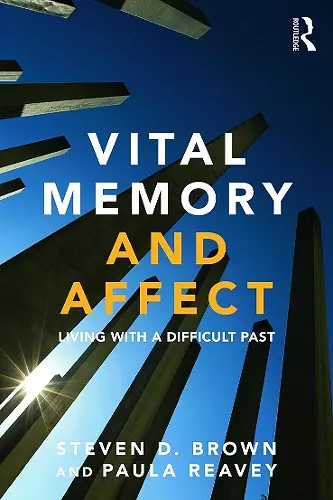Vital Memory and Affect
Living with a difficult past
Steven Brown author Paula Reavey author
Format:Paperback
Publisher:Taylor & Francis Ltd
Published:12th Jun '15
Currently unavailable, and unfortunately no date known when it will be back
This paperback is available in another edition too:
- Hardback£145.00(9780415683999)

Vital Memory and Affect takes as its subject the autobiographical memories of ‘vulnerable’ groups, including survivors of child sexual abuse, adopted children and their families, forensic mental health service users, and elderly persons in care home settings. In particular the focus is on a particular class of memory within this group: recollected episodes that are difficult and painful, sometimes contested, but always with enormous significance for a current and past sense of self. These ‘vital memories’, integral and irreversible, can come to appear as a defining feature of a person’s life.
In Vital Memory and Affect, authors Steve Brown and Paula Reavey explore the highly productive way in which individuals make sense of a difficult past, situated as they are within a highly specific cultural and social landscape. Via an exploration of their vital memories, the book combines insights from social and cognitive psychology to open up the possibility of a new approach to memory, one that pays full attention to the contextual conditions of all acts of remembering.
This path-breaking study brings together a unique set of empirical material and maps out an agenda for research into memory and affect that will be important reading for students and scholars of social psychology, memory studies, cultural studies, philosophy, and other related fields.
'I was invited to review a book that discussses implications ofr memory in the context of vulnerable populations... What I found was a compassionate and creative approach to the art of defining oneself through the powerul tools of self-narrative... As a memory researcher, this book led me to new and interesting territory... To me, the book seems best suited for practitioners who are looking for a new framework within which to think about how personal memories may undermine the vulnerable people they work with and how memory might be used therapeutically. The book is filled with transcriptions of simple social interactions and, in that way, it feels like a clinical workbook of sorts... If a new perspective emerges that provides a better structure for managing the vital memories that Brown and Reavey refer to, I am all for it. This book may well spark a concerted effort toward that goal... The basic message--that it is possible even for vulnerable people to take control and define themselves through self-narrative--is a powerful one.'
-Nancy Franklin, Department of Psychology, Stony Brook Univeristy, PsycCRITIQUES
‘Brown and Reavey show how personal and institutional practices of remembering interact in specific, highly-charged settings. In powerful, moving reports of empirical studies, they reveal the richness and diversity of ordinary people's subtle strategies for managing memories of difficult experiences. This compelling book will challenge and reward scientists, practitioners, and policy-makers interested in the mechanisms and techniques driving our complex ecologies of remembering.’
– John Sutton, Department of Cognitive Science, Macquarie University, Australia
'Brown and Reavey calmly yet devastatingly disassemble long standing key assumptions and models in the interdisciplinary study of memory. They render the complex accomplishments of remembering intelligible and familiar; a truly liberating work.'
– Andrew Hoskins, Editor-in-Chief, Memory Studies
"The supreme appeal of Brown and Reavey's conceptual and empirical work lies in how they afford ways for psychology to study memory beyond the life-space of the person, to ask how person and environment, body and ecology, life and cosmos, topologically fold and extend to shape and actualize possible worlds. And so the authors serve a compelling account why vital memories challenge received methodological and ontological certainties in psychology, and therefore matter for academic and clinical psychologists alike."– Matthew J. Allen, British Journal of Psychology
‘Brown and Reavey show how personal and institutional practices of remembering interact in specific, highly-charged settings. In powerful, moving reports of empirical studies, they reveal the richness and diversity of ordinary people's subtle strategies for managing memories of difficult experiences. This compelling book will challenge and reward scientists, practitioners, and policy-makers interested in the mechanisms and techniques driving our complex ecologies of remembering.’
– John Sutton, Department of Cognitive Science, Macquarie University, Australia
'Brown and Reavey calmly yet devastatingly disassemble long standing key assumptions and models in the interdisciplinary study of memory. They render the complex accomplishments of remembering intelligible and familiar; a truly liberating work.'
– Andrew Hoskins, Editor-in-Chief, Memory Studies
ISBN: 9780415684019
Dimensions: unknown
Weight: 385g
244 pages